Centered on connecting
by Kate Frentzel
In September, a brand-new center for faculty support and development opened its doors on the Luther campus. CELT—the Center for Excellence in Learning and Teaching—was founded as a space where faculty can gather to learn inclusive, innovative classroom practices and to collaborate with and learn from peers across disciplines.
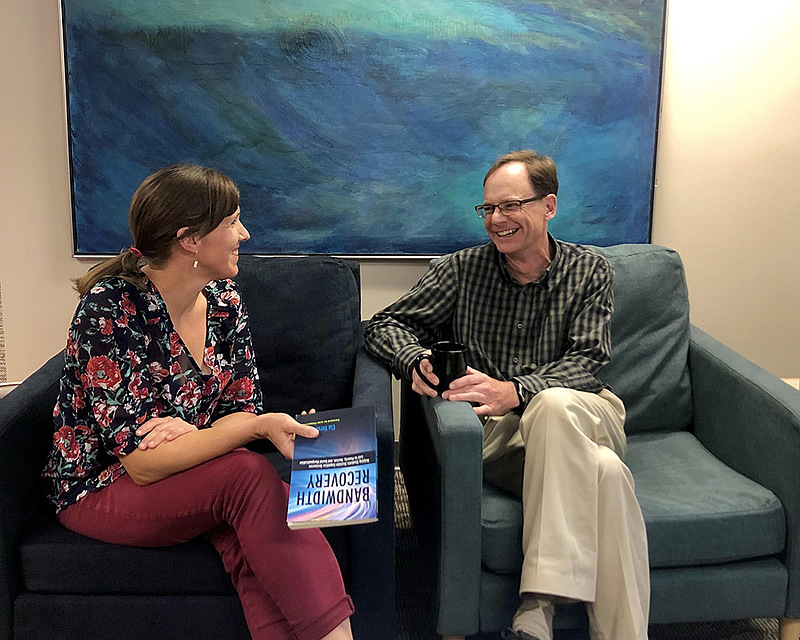
CELT director Kate Elliott chatted last fall with associate dean and faculty member Jeff Wilkerson in the CELT office space, a new support center for faculty.
Little did we know in September that what we created as a distinctly place-based center would have to stretch and pivot to support faculty in a very non-place-based way as campus shifted to distance teaching during the COVID-19 pandemic.
Fortunately, the strong groundwork that CELT staff laid during the fall semester allowed them to support this transition with speed, understanding, innovation, and resilience. The result? Luther professors who feel empowered to teach and able to connect with students even through a new kind of classroom.
In the non-pandemic world, CELT is a welcoming room in Valders Hall of Science—one with couches, a giant whiteboard, and a stocked mini fridge. It’s a place where faculty take workshops on how to grade faster and how best to use KATIE, the college’s web-based system through which students and faculty access digital course materials.
Through the center, faculty looking to revamp a writing assignment or revise a rubric that’s not working can schedule a one-on-one session with writing director Mike Garcia, who helps to staff CELT. If they want to explore technology in their classroom, they can book time with CELT staffer Holly White, instructional technology librarian.
CELT is also a place for faculty to talk about their biggest triumphs of the week, late-work policies, or the newest book on inclusive pedagogy. “Those sorts of practical but also philosophical discussions are what interest faculty most,” says CELT director Kate Elliott. “People really want to talk about the craft of teaching, and CELT is a place to find some fellowship and talk about what it is that we do at Luther.” Of course, these in-person resources were part of a world before COVID-19 turned every classroom in the country upside down.
As soon as there were signs of colleges starting to move online, CELT pulled a team together to consolidate resources behind this possible transition. So when President Ward announced in mid-March that Luther too would move to distance learning starting the Monday after spring break, March 29, CELT was already in full swing.
The team CELT assembled quickly created a landing page for faculty called Moving Your Courses Online Rapidly. It includes video training and written instructions on how to make the most of the digital tools that are always available to faculty, like KATIE and Norse Apps. The team offered in-person consultations to faculty with specific needs. They troubleshot software issues and gathered and dispersed new digital media resources.
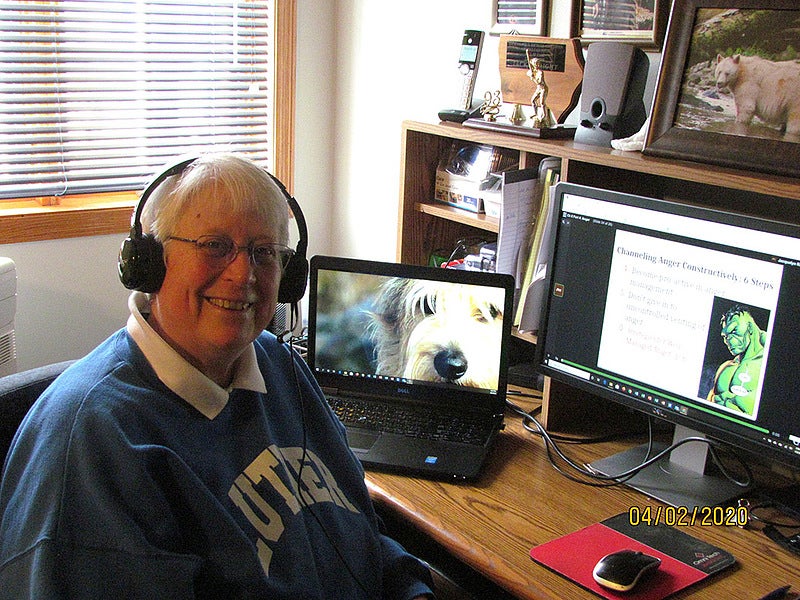
The team that CELT assembled helped faculty quickly transition to online teaching in March. Jacki Wright ’75, associate professor in health promotion and exercise science, had never taught online before COVID-19. But, she says, “One of the positives about this experience is that I have to think more outside the box to discover creative ways to engage students and keep them excited to learn.”
One thing CELT helped faculty think through early on was whether to teach online courses synchronously (in real time, with everyone gathered at the same time in the same virtual space) or asynchronously, so that students access lectures and course materials on their own timeline.
Sean Burke, the associate dean and director of faculty development who oversees CELT staff, says, “The challenge is how to keep the sense of connectedness and the relationships that are the core of a residential liberal arts college experience. We’re trying to help faculty think through how to do that through more limited means, like one-on-one conferencing or breaking your class into small groups that can do some Google Hangouts with each other.”
The trick, Burke says, is balancing that real-time connection with real obstacles that students may encounter, like bandwidth limits, data plans limits, time zone issues, or caring for young siblings who are also at home. “So we’re helping faculty balance how to keep the rhythm of a residential liberal arts college without overwhelming students who are also now reintegrating into some sort of rhythm at home,” he says.
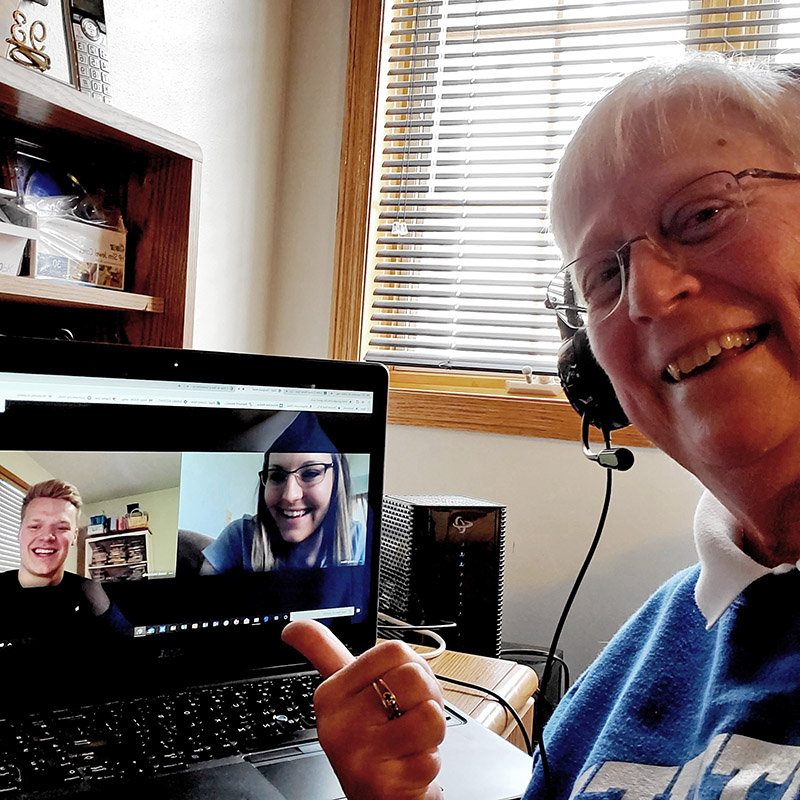
Wright meets with two of her students via Google Hangouts.
Jacki Wright ’75, associate professor in health promotion and exercise science, had never taught online before the pandemic. She originally thought she’d teach synchronously. But after a CELT workshop, she says, “I found it would be more beneficial, in my case, to offer courses asynchronously. If I do need to meet with students as an entire class synchronously, I now know how to do that.”
CELT was designed to be synergistic, with faculty members sharing their expertise in order to elevate the entire Luther teaching community. That’s exactly what happened when professor of Spanish Nancy Gates Madsen shared with CELT staff her experience using VoiceThread, a tool that facilitates online discussions and allows for multimedia engagement between students and faculty. Gates Madsen says, “Kate wasn’t as familiar with VoiceThread, which we’ve been using for many years in Spanish. Since we live in the same neighborhood, she was able to stop by my house for a bit of training, which she could then pass along to the wider Luther community. The benefits of working at a small college in a small town!”
Part of CELT’s synergy results from the strong relationship-building that the center’s staff—particularly Elliott—have done in its short time. Burke says, “Kate is incredible at relationship-building within the college, and that became a key in this transition. Faculty felt like she was someone they could talk to, and she would then help make the connections that needed to be made for them to do what they needed to do.”
Burke continues, “That’s another role that has emerged for CELT during this time: as a connector. We may not have all the resources directly, but we can connect you with where you can get those resources.”
For a tight-knit college community like Luther, the remote-learning format is really different. In order to provide the best experience possible, faculty are actively seeking feedback as the semester unfolds. Nancy Barry, professor of English, says, “Students are being very proactive at responding to problems or ‘kinks’ in the system, and KATIE can help me keep track of how many have been able to access the system, which is great.”
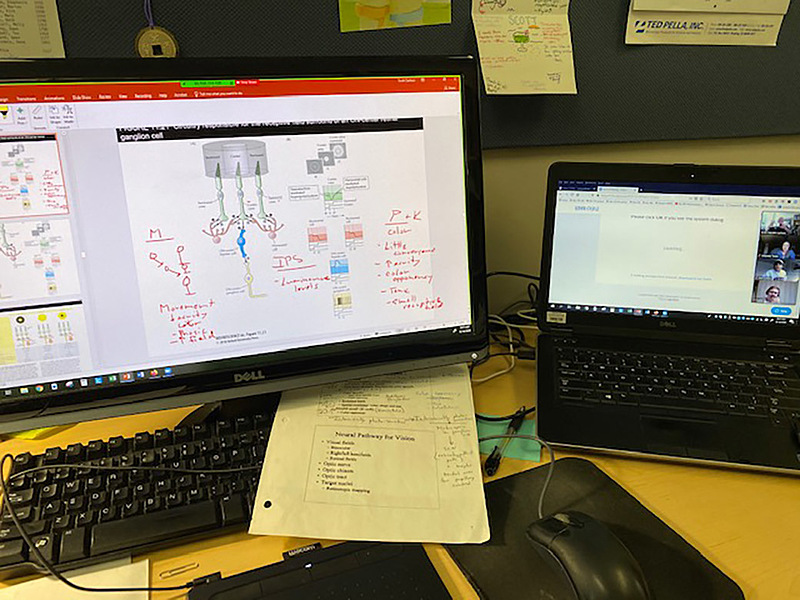
This is part of professor of biology Scott Carlson’s remote-teaching setup. He works with tools CELT staff trained him on so that during class discussion, he can write details on his shared screen, draw on figures to emphasize parts, and move between files easily.
Scott Carlson, professor of biology, says, “The general biology instructors meet via Zoom quite frequently to establish what our goals for each lab are and how we can best meet these goals in an online format. We also regularly seek feedback from students so that we can revise our approach as we go.”
Some faculty are finding positives in the growth they’ve done as educators during this time. “I had to learn new technology quickly but have found this process to be stimulating, challenging, and fun!” Wright says. “One of the positives about this experience is that I have to think more outside the box to discover creative ways to engage students and keep them excited to learn.”
But for a breed of teachers who are truly enlivened and inspired by their students, nothing can replace spending real-world time together. “Perhaps the biggest challenge,” Carlson says, “is that teaching at Luther is very relational. We get to know students personally as we interact with them, and we are all richer for this experience. For my neuroscience course, I have had almost all of these students before, some in multiple courses, and this course represents the pinnacle of our time together. With general biology, these interactions serve as the starting point for getting to know a new group of students, many of which I will encounter again in my courses down the road. So I am saddened by the loss of this, whether it be getting to know a new group of students or seeing a group I know so well finish their time at Luther. I think we would all agree that online educational experiences are not nearly as effective as when students are seated in our classrooms and laboratory spaces, but we have to accept the uniqueness of this situation and, in response, strive to create the best possible educational outcome that we can.”
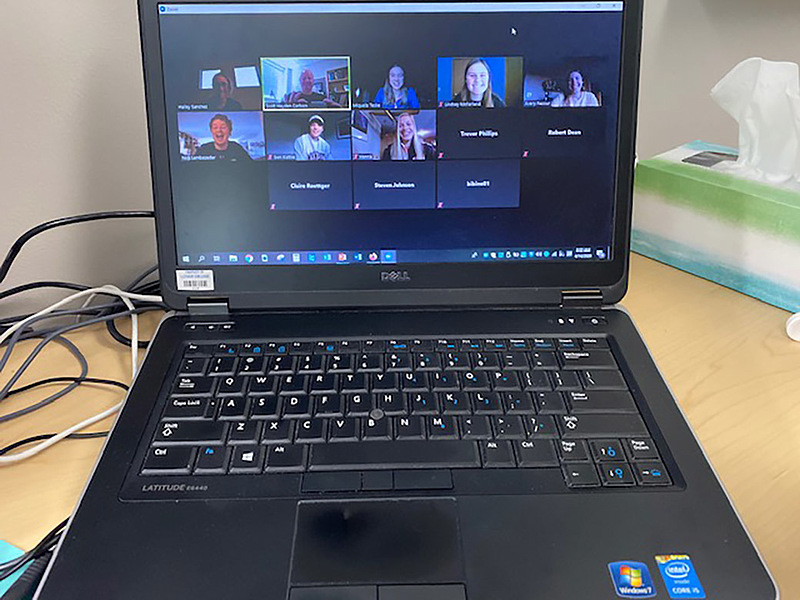
This is part of professor of biology Scott Carlson’s remote-teaching setup. He works with tools CELT staff trained him on so that during class discussion, he can write details on his shared screen, draw on figures to emphasize parts, and move between files easily.
Fortunately, the team that CELT assembled to respond to this crisis has positioned teachers—and students—for the best possible outcome. While the semester may not be traditional in any sense of the word, we know one thing holds true: Luther learning transcends classrooms.
For information on ways to support CELT, please call the Development Office at (800) 225-8864 to speak with a Development officer, or visit luther.edu/giving.